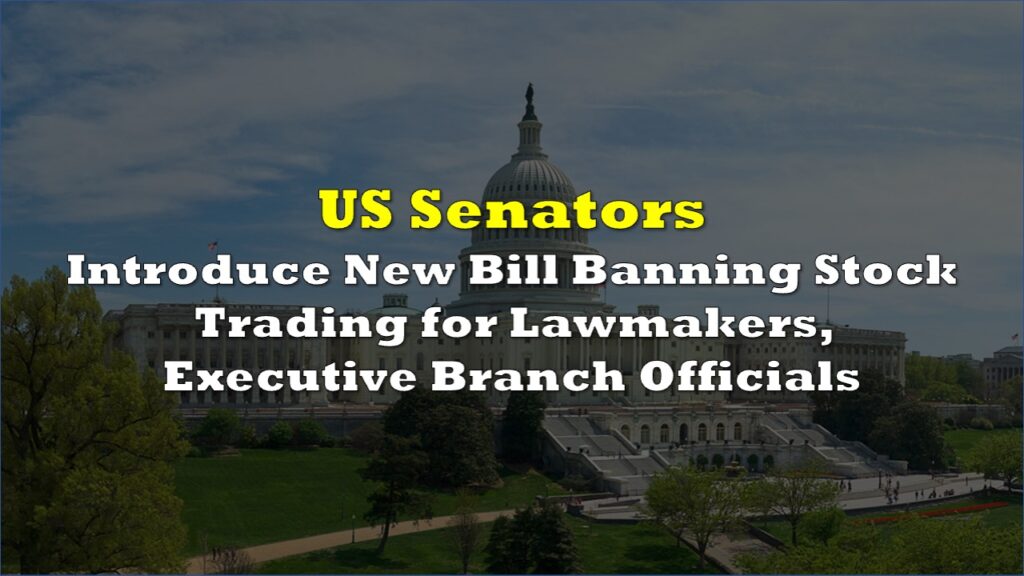A bipartisan group of senators has reached an agreement to ban lawmakers from trading stocks. The proposed legislation, crafted by Democratic Senators Jon Ossoff, Gary Peters, and Jeff Merkley, and Republican Senator Josh Hawley, would prohibit members of Congress from buying or selling stocks.
The bill aims to take effect 90 days after being signed into law. Additionally, it sets a timeline for banning stock trades by lawmakers’ spouses and dependent children starting in March 2027.
Under the new rules, members of Congress and high-ranking officials such as the President and Vice President would need to divest certain investments by 2027. Violations of the legislation would result in hefty fines: either the lawmaker’s monthly salary or 10% of the asset’s value, whichever is greater.
The push for a ban on stock trading by lawmakers has gained traction among voters but has faced hurdles in Congress. A report from Insider in 2022 revealed extensive trading activities among members of both the House and the Senate, raising ethical questions and concerns about potential conflicts of interest.
Peters, who chairs the Senate Homeland Security and Governmental Affairs Committee, underscored the importance of the bill, stating, “Americans deserve to have confidence that their federal elected officials are making decisions that are in the best interest of the American public and not in the interest of any personal finances and financial decisions that they make.”
BREAKING: Senator Jon Ossoff, Senator Jeff Merkley, Senator Gary Peters, and Senator Josh Hawley have come to a bipartisan agreement to ban lawmakers from trading stocks.
— unusual_whales (@unusual_whales) July 10, 2024
They are holding a markup on the bill in two weeks.
Existing regulations prohibit lawmakers from using confidential information for financial gain and require public disclosure of stock trades. However, enforcement has been weak, with minimal penalties such as a $200 fine for violations. This lax enforcement has led to the proliferation of investment products allowing ordinary investors to mimic congressional trades.
Ethics experts support the proposed legislation, noting its potential to mitigate conflicts of interest while allowing for market participation through mutual funds and pooled securities. Virginia Canter, chief ethics counsel at Citizens for Responsibility and Ethics in Washington, commented, “People have more and more access to sensitive nonpublic information when they’re in the government. It’s important to alleviate those conflicts of interest, but it doesn’t prevent them from being invested in the market.”
Despite previous bipartisan efforts to pass similar legislation, including a failed attempt under then-House Speaker Nancy Pelosi in 2022, the current agreement is buoyed by strong bipartisan support in the Senate. Hawley expressed optimism, saying, “Quite a number of my Republican colleagues ran in 2018, 2020, 2022 on banning stock trading. It was a part of their races. They said they would do it, they pledged to do it.”
In 2022, Pelosi faced scrutiny when it was revealed that her husband, Paul Pelosi, made significant stock trades in companies like Tesla, Apple, and Microsoft. These trades, made during critical periods of congressional activity and policy discussions, sparked widespread debate about the ethical implications and potential conflicts of interest.
Pelosi defended herself by maintaining that she does not personally own any stock and has no involvement in her husband’s investment decisions. She stated, “We’re a free-market economy. They [members of Congress] should be able to participate in that.” However, her stance was seen as controversial, especially given the influence and access to information that members of Congress hold.
The Senate Homeland Security and Governmental Affairs Committee will mark up the bill on July 24, setting the stage for potential advancement to the Senate floor. However, the bill will require 60 votes to overcome a potential filibuster, posing a significant challenge in the closely divided Senate.
The legislation also follows several high-profile stock trading scandals involving lawmakers. In early 2020, Senators Richard Burr, Dianne Feinstein, James Inhofe, and Kelly Loeffler faced scrutiny for substantial stock sales ahead of the COVID-19 market crash. While investigations by the Senate Ethics Committee and the Justice Department did not result in charges, the incidents highlighted the need for stricter regulations.
Information for this story was found via Axis, The Washington Post, and the sources mentioned. The author has no securities or affiliations related to the organizations discussed. Not a recommendation to buy or sell. Always do additional research and consult a professional before purchasing a security. The author holds no licenses.






One Response
Why does the public have to wait until 2027 to have this elected official advantageous behavior go away? Is it so that the insider information investments will have a chance to mature and pay off? This is just another large pile of BS originating from the slimy politicians who are the direct beneficiaries of non-action on any ruling restricting securities trading. The suggestion of a $200 fine is a slap in the face of the investors who don’t have the privilege of having non-public information to help them direct their trades. I have spent 40 years as a FINRA registered broker and understand the simply stated rules about public and non-public information, and one’s ability to use it for their own advantage. Any elected official should be subject to the same regulatory obligations that I am, period, no exceptions.